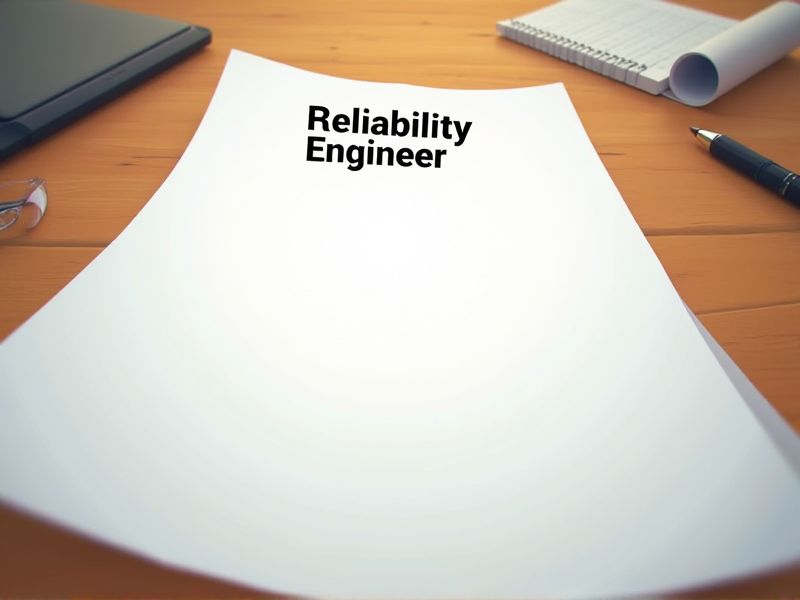
Reliability Engineers play a pivotal role in ensuring systems and products are dependable and efficient, often requiring a comprehensive understanding of industry standards and practices. Certifications provide validation of skills and knowledge, helping engineers effectively manage potential system failures and improve performance metrics. Holding specific certifications can also distinguish professionals in the competitive job market, showcasing their commitment to quality and reliability. Essential certifications for a Reliability Engineer include the following.
Certified Reliability Engineer (CRE) - ASQ
The Certified Reliability Engineer (CRE) certification from ASQ equips engineers with advanced skills in reliability testing and validation, ensuring product reliability. This certification provides credibility and demonstrates a strong understanding of risk management and failure analysis. Organizations prioritize CRE-certified professionals to improve product lifecycle and reduce maintenance costs. CRE certification helps reliability engineers align their practices with industry standards and best practices.
Certified Maintenance & Reliability Professional (CMRP) - SMRP
Certified Maintenance & Reliability Professional (CMRP) - SMRP adds credibility to a Reliability Engineer by validating their skills and knowledge in industry best practices. This certification enhances a professional's ability to reduce downtime, as it equips them with strategies to optimize maintenance processes. With CMRP, engineers gain a competitive edge in the job market, often resulting in higher career opportunities and compensation. Organizations benefit from employing CMRP-certified engineers by experiencing increased operational efficiency and reduced maintenance costs.
Certified Maintenance & Reliability Technician (CMRT) - SMRP
Certifications like the CMRT by SMRP validate a reliability engineer's technical proficiency in maintenance and reliability practices. Possessing this certification enhances an engineer's credibility within the industry, ensuring that they meet recognized standards. With a CMRT, a reliability engineer is better equipped to implement preventive and predictive maintenance strategies effectively. As organizations prioritize asset reliability to minimize downtime, the need for certified professionals becomes increasingly critical.
Six Sigma Black Belt Certification
Achieving the Six Sigma Black Belt Certification for a Reliability Engineer enhances their ability to identify and mitigate potential failures in system designs, as the certification focuses on process improvement through statistical analysis. The certification equips the engineer with advanced problem-solving skills, allowing them to implement data-driven decisions that increase operational efficiency and product reliability. It also provides a standardized framework to effectively analyze and manage risk, crucial in maintaining high reliability standards. Having this certification can lead to better cross-functional team collaboration, as it demonstrates a commitment to quality improvement methodologies recognized globally.
Six Sigma Green Belt Certification
Six Sigma Green Belt Certification equips reliability engineers with essential statistical tools to identify and reduce process variation, enhancing overall product reliability. This certification fosters a structured problem-solving approach that aligns with quality improvement goals, refining engineering decision-making processes. Engineers with this certification are more adept at implementing and sustaining effective reliability programs, leading to decreased equipment downtime and cost savings. Possessing this qualification often enhances career prospects, as organizations value proven competence in minimizing defects and optimizing operational efficiency.
Lean Manufacturing Certification
Lean Manufacturing Certification equips Reliability Engineers with tools to systematically identify and eliminate waste, leading to more efficient processes. This certification enhances their ability to streamline operations, directly impacting product quality and reducing downtime. With lean principles, reliability engineers can effectively ensure resources are optimized, improving overall equipment effectiveness. Their enhanced expertise contributes to sustainable operational practices, aligning with organizational goals for cost reduction and performance enhancement.
Project Management Professional (PMP) Certification
PMP certification enhances a reliability engineer's ability to effectively manage projects, leading to improved project outcomes. It provides a structured approach to project management, ensuring that projects meet time, cost, and quality targets. With the rising complexity of engineering projects, the PMP certification equips engineers with essential skills to handle multidisciplinary teams. Organizations often prefer certified professionals, which can enhance career opportunities for reliability engineers.
ISO 9001:2015 Lead Auditor Certification
ISO 9001:2015 Lead Auditor Certification equips reliability engineers with a comprehensive understanding of quality management principles, enhancing their ability to implement effective quality controls. This certification enables engineers to conduct thorough audits, ensuring that reliability processes adhere to international standards. It fosters a culture of continuous improvement, crucial for maintaining system reliability and operational excellence. By possessing this certification, reliability engineers can contribute to reducing failure rates and extending the lifecycle of products.
PMI Risk Management Professional (PMI-RMP) Certification
Obtaining a PMI Risk Management Professional (PMI-RMP) Certification equips a Reliability Engineer with advanced risk management skills, enhancing their ability to foresee and mitigate potential failures in systems. By understanding and applying comprehensive risk analysis techniques, engineers can improve system reliability and optimize maintenance strategies. As organizations increasingly emphasize risk management to ensure safety and efficiency, PMI-RMP certification provides a competitive edge in the job market. Certification ensures engineers stay updated with industry standards and best practices, aligning their work with established risk management frameworks.
ISO 55000 Asset Management Certification
ISO 55000 provides a structured framework for asset management, enhancing a reliability engineer's ability to optimize asset performance and life cycle management. By adhering to these standards, organizations can systematically reduce operational risks, which aligns with a reliability engineer's goals of minimizing equipment failures and maximizing uptime. The certification fosters a culture of continuous improvement, allowing engineers to implement best practices and innovative solutions. Furthermore, it aids in regulatory compliance, ensuring that engineers operate within legal and industry-specific guidelines.
Summary
When you acquire certifications as a Reliability Engineer, you enhance your credibility and marketability in the industry. This recognition often leads to better job prospects and potentially higher salaries. Your expertise in reliability principles can improve system performance and reduce downtime. Employers are more likely to trust your methods, increasing your influence within project teams.
